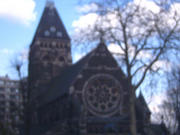Unitarian Universalists
Universalists and Unitarians
Universalism was founded in the first century A.D. with the basic principle that God was unconditional all-encompassing Love. The basic philosophy being that God was merciful and kind and wants the best for all of his children, therefore everyone has the right to eternal salvation and redemption. Universalism holds not one faith or belief higher than another but seeks to learn from the truths of all religious views. Universalism may in fact be the original heresy of the orthodox church. Michael Servetus wrote "On The Errors of the Trinity" which led to his execution at the stake in 1553 in John Calvin's Geneva for his Unitarian heresy. King John Sigismund of Transylvania (now a part of Romania and Hungary) in 1568 issued the first edict of religious freedom. This allowed citizens to hold diverse religious beliefs and still be loyal to the state. The first church to call itself Unitarian was established in Transylvania, in 1638. During the 17th and 18th centuries, Universalist groups were formed in England. The first Universalist congregation was organized in 1750 in London by Rev. James Relly, who ministered to its spiritual needs until his death in 1778 .In America, Universalism developed from the influence of the Pietist movement (religion of the heart) in Europe: The Society of Friends, Moravians, Methodists, Lutherans, Schwenkfelders, Brethren, and others. Five American Presidents, including Thomas Jefferson, John Adams, and John Quincy Adams, were Unitarians. Benjamin Rush, a signer of the Declaration of Independence and an avowed Universalist, was a vigorous foe of slavery, advocated the abolition of the death penalty, an advocate of better education for women and of free public schools, a pioneer in the study and treatment of mental illness, insisted that the insane had a right to be treated with respect. He published a pamphlet on the iniquity of the slave trade, and helped organize the Pennsylvania Society for Promoting the Abolition of Slavery and the Relief of Free Negroes Unlawfully Held in Bondage, the first antislavery society in America, and served as its president. John Murray, in 1779 became the minister of the first Universalist church in the U.S. at Gloucester, MA. An organization which was to become the Universalist Church of America was formed in 1785. The first organized American church to turn to Unitarianism, however, was not a Congregational church but the Episcopal King’s Chapel in Boston in 1785. Joseph Priestly, chemist and Unitarian Minister, established the first Unitarian Church in the U.S. in 1796. In 1805, Hosea Ballou authored "A Treatise on Atonement" which argued against the Trinity, Hell, and the existence of miracles. He is sometimes referred to as "The Father of American Universalism". By 1810, there were 20 Unitarian churches in England. In the U.S., many churches were founded which were Unitarian or professed Unitarian beliefs. Theirs was largely a reaction to the rigidity of Calvinist belief in New England. These churches formed the American Unitarian Association in 1825. At its peak in the 1830s, the Universalist Church was around the 9th largest denomination in the United States. ). There are four colleges founded by Universalists: Tufts College (founded in 1852) Medford, Mass.; Lombard College (1852), Galesburg, Illinois; St. Lawrence University (1856), Canton, New York; Buchtel College (1872), Akron, Ohio The first Unitarian church in Canada was established in Montreal in 1842. Olympia Brown was ordained by the Universalist denomination in 1863, thus becoming one of the first female ministers in the U.S. She promoted women's rights (particularly suffrage) and pacifism. Rodger Baldwin, a raised by his parents as an “Agnostic Unitarian” helped to form the American Civil Liberties Union in 1920. In 1961, the Unitarian and Universalist churches merged to become the Unitarian Universalist Association (UUA).
A brief history of Unitarians and Universalists in their own words.
The Unitarian Universalist Service Committee advances human rights and social justice around the world, partnering with those who confront unjust power structures and mobilizing to challenge oppressive policies.
The Unitarian Universalist United Nations Office promotes the goal of world community with peace, liberty and justice for all, as reflected in the United Nations Charter.
The mission of The Quaker Universalist Friends is to foster the understanding that within everyone is a directly accessible spiritual light that can lead people to equality, simplicity, justice, compassion and peace.
The Covenant of Unitarian Universalist Pagans (CUUPS) is an organization dedicated to networking Pagan-identified Unitarian Universalists (UUs), educating people about Paganism, promoting interfaith dialogue, developing Pagan liturgies and theologies, and supporting Pagan-identified UU religious professionals.
UUDPR is a continental coalition of Unitarian Universalists leading the denomination's efforts to develop and promote more just and compassionate drug policies. In accordance with the denomination's new drug policy Statement of Conscience, we advocate that drug use should be a health issue, not a crime.
Universal Life Church
Get Ordained Now!
